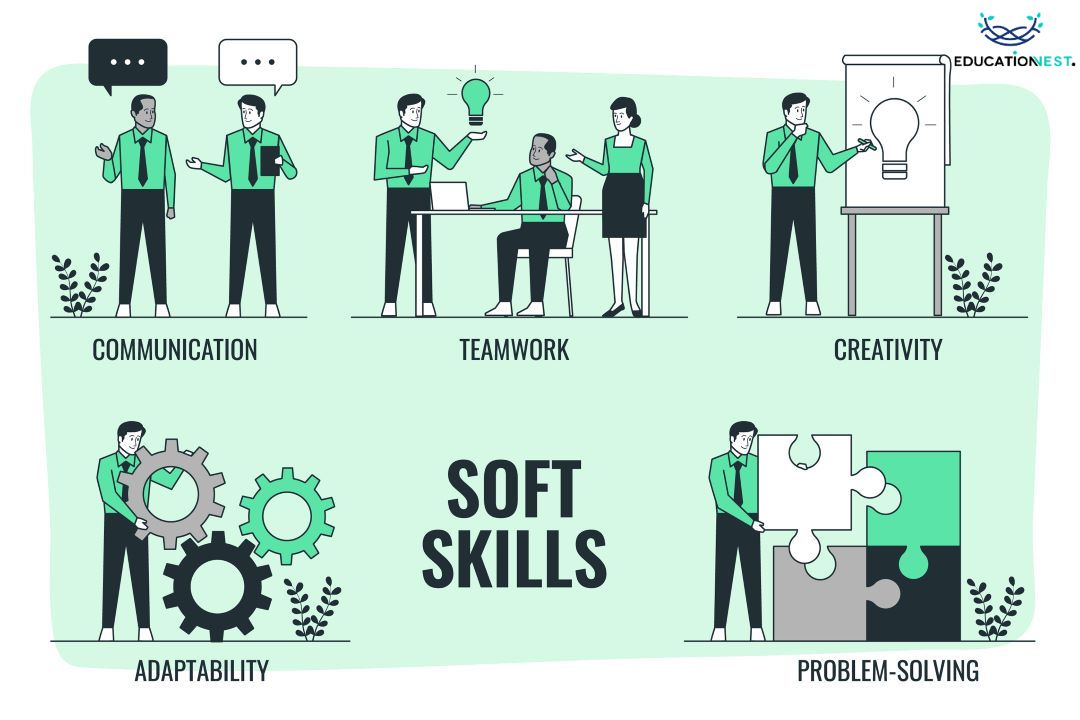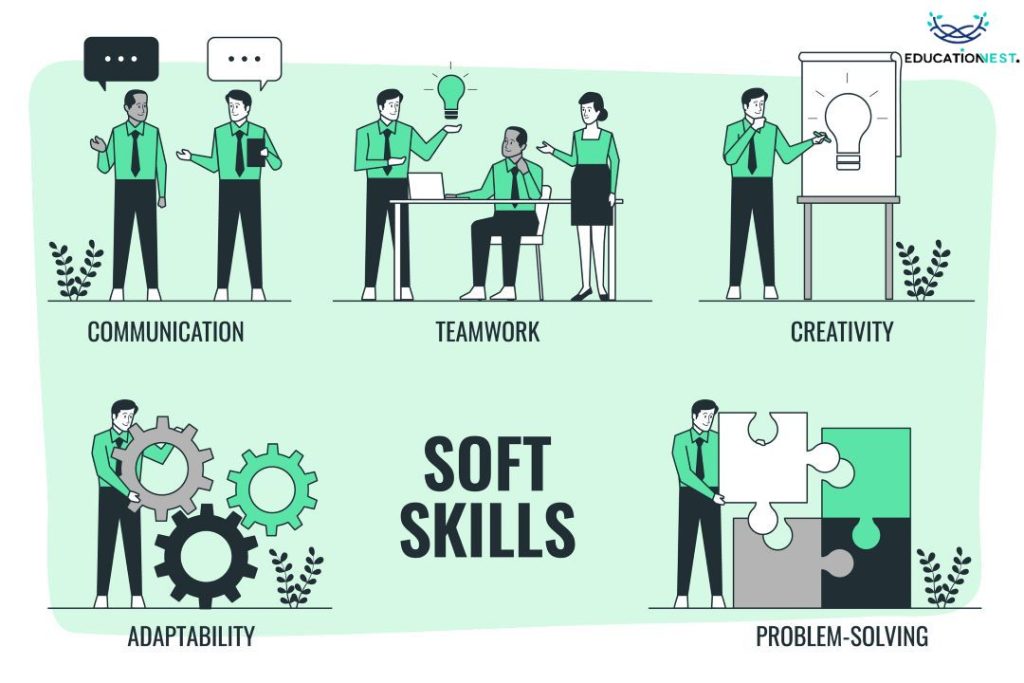
In the ever-evolving landscape of the job market, the importance of soft skills has never been more pronounced. In 2024, as we navigate the challenges and opportunities presented by the digital age, soft skills continue to be a critical component of personal and professional success. So, why are soft skills so important, and what makes them indispensable in this era?
In this blog, we will explore the world of soft skills, their significance, and the role they play in shaping the future of work. Join us on this journey as we unravel the mysteries of soft skills and their undeniable importance.
What Are Soft Skills?
Before we delve into why soft skills are essential in 2024, let’s first understand what soft skills are. Soft skills, often referred to as interpersonal or people skills, are the personal attributes, communication abilities, and emotional intelligence that enable us to work effectively with others. Unlike hard or technical skills, which are job-specific and can be measured and taught, soft skills are about how you interact with and relate to people.
Here are some common examples of soft skills:
- Communication: The ability to express ideas and information clearly and effectively, both in written and verbal forms.
- Leadership: The capacity to inspire, guide, and motivate a team, even in challenging situations.
- Emotional Intelligence: Being in touch with your own emotions and empathizing with the feelings of others, fostering better relationships and understanding.
- Time Management: Efficiently managing time and prioritizing tasks, increasing productivity.
- Problem Solving: The skill to analyze problems, make informed decisions, and find creative solutions.
- Adaptability: Being flexible and open to change, which is particularly valuable in today’s fast-paced world.
- Conflict Resolution: The ability to manage and resolve conflicts constructively.
- Teamwork: Collaboration and cooperation with others to achieve common goals.
How is Soft Skills Training Beneficial?

Soft skills training is more than just a buzzword. It’s a valuable investment in your personal and professional growth. Let’s explore the benefits of developing these essential skills.
- Enhanced Communication: Effective communication is the foundation of success in any field. Soft skills training hones your ability to convey ideas clearly, listen actively, and understand others, making you a more effective communicator.
- Improved Leadership: Whether you’re a manager, team leader, or an aspiring leader, soft skills training can equip you with the tools to inspire and guide your team, ultimately enhancing your leadership capabilities.
- Boosted Emotional Intelligence: In a world that demands empathy and understanding, soft skills training can enhance your emotional intelligence, enabling you to build stronger connections with colleagues, clients, and peers.
- Greater Productivity: Time management and prioritization are key soft skills that can significantly increase your productivity. By mastering these skills, you’ll become more efficient and better equipped to tackle tasks and projects.
- Creative Problem Solving: Soft skills like problem-solving and critical thinking empower you to tackle challenges with creativity and resourcefulness. This, in turn, can lead to innovative solutions and a competitive edge in your career.
- Adaptability to Change: In a rapidly changing world, adaptability is a prized skill. Soft skills training can help you embrace change and thrive in dynamic environments.
- Conflict Resolution: Conflicts are inevitable, but soft skills training can teach you how to manage and resolve them constructively, minimizing disruptions and fostering a positive work environment.
What Is the Importance of Soft Skills Training?
Now that we’ve discussed the benefits of soft skills training, it’s time to dig deeper into why it is essential in 2024. The world of work is evolving at a rapid pace, and soft skills are becoming increasingly crucial for several reasons.
- Automation and Technology: As automation and artificial intelligence become more prevalent in the workplace, the demand for employees with strong soft skills is on the rise. Machines can perform many technical tasks, but they can’t replicate the human touch and emotional intelligence that soft skills provide.
- Remote Work: The global shift towards remote work has highlighted the importance of effective communication, time management, and adaptability. Soft skills are essential for remote workers to stay connected and productive.
- Collaboration: In today’s interconnected world, collaboration is essential. Soft skills like teamwork and communication are essential for working harmoniously with colleagues across the globe.
- Customer-Centric Approach: Businesses are increasingly focused on providing exceptional customer experiences. Soft skills such as empathy and active listening are pivotal in understanding and addressing customer needs effectively.
- Competitive Advantage: In a competitive job market, possessing strong soft skills can set you apart from other candidates. Employers value these skills and see them as an asset to their organization.
Also Read:
The Essential Skills You Need for Future Jobs in Educational Technology
What Role Do Soft Skills Play for Employees?
For employees, soft skills are the secret sauce that can propel them to greater heights in their careers. Let’s explore the specific roles soft skills play for individuals in the workplace.
- Career Advancement: Soft skills are often the differentiator between two employees with similar technical skills. They can help you climb the career ladder, earn promotions, and take on more responsibilities.
- Job Satisfaction: Soft skills, such as emotional intelligence and conflict resolution, contribute to a harmonious work environment, leading to increased job satisfaction and reduced stress.
- Effective Networking: Building professional relationships and expanding your network is crucial for career growth. Soft skills, particularly communication and interpersonal skills, are invaluable for successful networking.
- Leadership Potential: Aspiring leaders can harness soft skills to inspire and lead teams effectively. Leadership development often includes training in soft skills to prepare individuals for management roles.
- Stress Management: Soft skills like time management and adaptability help employees manage stress and maintain a healthy work-life balance.
- Cross-Functional Collaboration: Soft skills enable employees to work seamlessly with colleagues from diverse backgrounds and departments, fostering cross-functional collaboration and innovation.
Are Soft Skills Worth It?
By now, you may be wondering if investing time and effort in developing soft skills is truly worth it.
The resounding answer is yes!
Here’s why soft skills are absolutely worth the investment:
- Long-Term Value: Soft skills have enduring value in your personal and professional life. Unlike technical skills, which can become outdated, soft skills are timeless and adaptable to various situations.
- Career Resilience: In an ever-changing job market, possessing strong soft skills can make you more resilient. They provide you with the ability to pivot, learn new skills, and adapt to new challenges.
- Improved Well-Being: Soft skills can lead to greater emotional intelligence, better relationships, and reduced stress, all of which contribute to your overall well-being and happiness.
- Competitive Edge: Soft skills are a competitive advantage in the job market. Employers actively seek candidates with strong soft skills, making you a more attractive prospect for job opportunities.
- Better Quality of Life: Beyond the workplace, soft skills enhance your personal relationships, making you a better friend, partner, and family member.
Conclusion
In 2024, the importance of soft skills cannot be overstated. As the world of work continues to evolve, these interpersonal abilities are becoming increasingly critical for personal and professional success. From enhanced communication to improved leadership, soft skills training offers a plethora of benefits that can shape your career and your life.
So, whether you’re an employee looking to advance in your career, a job seeker aiming to stand out in a competitive market, or an individual striving for personal growth, investing in soft skills is undoubtedly a wise choice. The world may change, but the value of soft skills remains constant, making them an essential asset on your journey to success in 2024 and beyond. Don’t miss out on the opportunity to enhance your life by developing and nurturing these indispensable skills. Embrace the soft skills revolution, and watch your career and personal life flourish.

